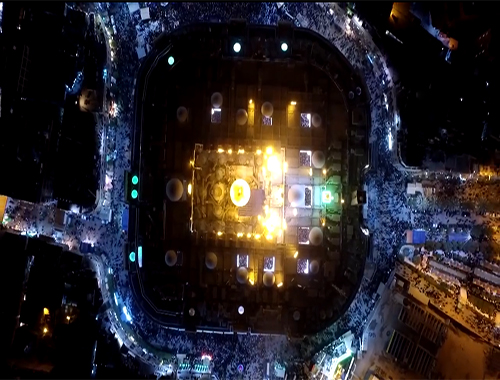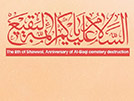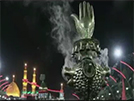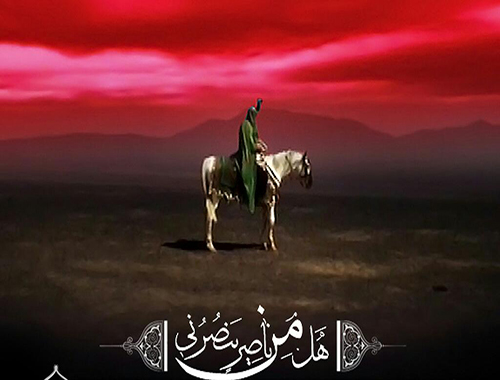Islamic Legislative System of Imam Reza (AS)
- Details
- Hits: 6716
.jpg)
Islamic Legislative System of Imam Reza (AS)
We do not attempt here to present the legislative heritage left us by Imam al-Reza (AS) or trace the ahadith which were reported about him in this regard, for this is the job of authors of books of hadith and fiqh. What we would like to deal with here, rather, is to evaluate the knowledge which reached us from him and from other Imams of the Ahl al-Bayt (AS) in the area of legislation, and the safe route they took in providing us with a basis for deriving such legislative rules from their accurate source.
As we stated in the Introduction, what caused us to follow the creed of the Ahl al-Bayt (AS) and use their hadith as a source for legislation is due to the clear and unequivocal statements of the Prophet (p.b.u.h) regarding the necessity of upholding their way and following their guidance such as the tradition of the two weighty things (hadith al-thaqalayn) and of the ark of Noah (AS), and other ahadith which cannot be doubted in their authenticity, structure, or objective.
This is why any hadith reported by Imam al-Reza (AS) or by any other Imam is regarded as though it had been said by the Prophet (p.b.u.h) not because these Imams have the authority to initiate legislation, or be independent in enjoying the responsibility of inventing a legislative rule, but by considering it an extension of the pristine legislation brought forth by the Prophet (p.b.u.h) from his Lord, due to what they learned of the secrets of legislation and its fruits left for them as a legacy by the Prophet (p.b.u.h), after being made by the Almighty as custodians of the Message after the Prophet (p.b.u.h).
Their Hadith is Muhkam and Mutashabih
The hadith narrated about them is, as is the case with the Holy Qur'an, both muhkam and mutashabih. The muhkam, as its name suggests, does not accept but one single meaning, while the mutashabih is on the contrary permitting many facets of interpretation, and its actual meaning is not known exactly. This is the meaning we accept for these two terms.
Imam al-Reza (AS) is quoted in a narration as having said, "Among our narratives are mutashabih like the Qur'an's, and also muhkam like the Qur'an's; so, seek help from the muhkam to understand the mutashabih, and do not follow the mutashabih without the muhkam else you should stray."
Justifying the Mutashabih in the Qur'an
The Commander of the Faithful (AS) justifies the existence of Qur'anic verses which can be interpreted in more than one way by saying: "The Almighty has done so in order to foil the attempt of wrong-doers from among those who would take control over the legacy of the knowledge of the Book left by the Messenger of God (p.b.u.h), which he did not intend them to acquire, rendering them unable to explain the various possible meanings thereof."
It is as if God willed that the Prophet (p.b.u.h) and those who would bear the Message after him would have a special distinction which is the understanding of what others are not able to understand so that people would resort to them when they are unable to understand certain verses of the Holy Qur'an which they need to understand for the betterment of their life and the comprehension of their creed.
Justifying the Mutashabih in the Hadith
As regarding the existence of the mutashabih in the hadith reported about the Ahl al-Bayt (AS), as the Imam pointed out in his tradition cited above, this can be justified in the following manner:
These Imams (AS) used to suffer a great deal of persecution at the hands of their contemporary rulers who incessantly pursued them and their followers, forcing upon them a very strict surveillance, counting their breath. In many cases, in the face of such an intolerable treatment at the hands of those rulers, the Imams had to resort to the taqiyya in many of their deeds and sayings.
They might have been asked, for example, about their judgement of a particular incident, or about something related to the creed and school of thought, and they would answer in a way which permitted more than one way of understanding the answer due to their own apprehension of the ruler's watchdogs and informers.
The meaning may be derived at the time the question is put forth when a related matter is at hand. It will be built according to one of the possibilities inspired by the text which would provide the inquirer with the desired satisfaction of the answer while, at the same time, such possibilities are hidden from others who will be confused about them and about the actual meaning the Imam (AS) meant thereby.
It is then that it must be compared with other ahadith said on similar occasions, or with the context of bases which agree with it and which were set by them, peace be upon them. The meaning of the mutashabih may be similar to the general and the particular, the unrestricted and the absolute, while the general and the absolute would then be similar to the mutashabih, the special and the restricted would be similar to the muhkam.
Genuineness of the Creed of Ahl al-Bayt
We cannot find in any other sect the genuineness which characterizes the creed of the Ahl al-Bayt (AS) in the area of legislation, for it relies on a deep understanding of the Holy Qur'an and the pristine Prophetic Sunnah which derives from its original leading fountainhead a source of its legislation and such rules.
For example, according to a narrative, a man asked Imam al-Reza (AS) about another man who said at the time of his death, "Any old slave I have is now emancipated for the sake of pleasing God." The Imam said, "Yes, there is a way to determine who is `old' according to the Almighty and Praised God Who says in His Book, `... till it became like an old date cluster;' therefore, anyone among his slaves who has been with him for at least six months must now be freed."
The date cluster becomes old and dry during the period of six months. In this example, the Imam (AS) did not contend himself by just providing a legislative rule; he also derives its rule from the text of the Holy Qur'an.
Independence of the Ahl al-Bayt (AS) From Qiyas and Others
The Ahl al-Bayt (AS) did not sense the need to seek avenues which were distant from the legislative realities in the conclusions they reached such as qiyas (comparison), istihsan (preference), etc., which were regarded by others as indicative of the legislative rule when they lack a concrete text, due to the fact that, because of the knowledge and the secrets of the Message which they inherited from their grandfather the Messenger of God (p.b.u.h) as well as their own level of iman (firm belief), they were self sufficient, independent, and due to what God had endowed them with of the faculty of knowledge in order they might be His Proofs over people.
The Ahl al-Bayt (AS) strongly condemned the use of qiyas and other such methods invented by others as means whereby they would justify their derivations when they lacked a concrete evidence. Because of this, many strong confrontations happened between them and these people, and we may discuss this subject in detail in our forthcoming book about Imam al-Sadiq (AS) because the most violent of such confrontations took place during his time when promoters of various sects were free to express their views.
Imam al-Reza (AS)'s Hadith Regarding Legislation
There have been many ahadith reported about Imam al-Reza (AS) dealing in various aspects of fiqh which are used as final arguments in determining obligation when they meet all necessary conditions such as the authenticity of the avenue of its reporting and its lack of ignorance or weakness and the absence of ambiguity in its indication and connotation.
His Hadith Regarding Causations
There is also a great deal of 'ilal (causes or foundations) for the legislation of many ahkam (legislative rules) in his answers to questions raised by Muhammad ibn Sinan, and also in his answers to Ibn Shathan at the end of which the narrator mentioned that he learned them one after the other from Imam al-Reza (AS).
Our View Regarding Causes
But we cannot determine that they are the actual bases for the derivation of the legislative rules; rather, they are other facets of the wisdom of which the legislative system is full, and it is quite possible that the Imam may mention one cause and adds saying that it is one cause among others.
Questioning the Causes is Human Nature
The human nature by instinct is eager to know the underlying motives which lie behind the existence of things, ascertaining such motives, looking for the reasons behind what necessitated the causes, be it in the area of their genesis, i.e., the process of their creation, or their legislation, out of the principle that there is a motive for everything in existence especially when the creation is that of the Wise One Who does not do thing for self-amusement. This is why we find those who asked Imam al-Reza (AS) about the causes behind the legislation of some rules (ahkam) in accordance with man's questioning nature.
Imam's Answers are Harmonious With the Nature of Legislation
The Imam's answers were all in harmony with the environment of the occasion surrounding their legislation. Causes may be to achieve a social benefit, when the social aspect of legislation is more apparent than any other, or for a health, spiritual or psychological benefit, each according to whatever the nature of legislation inspires.
For example, when he explains the causes for the prohibition of adultery, the Imam (AS) says: "Adultery is prohibited due to the corruption it causes such as murders, loss of lineage, child desertion, chaos regarding inheritance, and other such aspects of corruption."
Here he determines the social causes behind the prohibition of adultery since the social aspect is more apparent in this case of legislation than any other.
From the same standpoint, the Imam (AS) explains to us why usury (riba) is prohibited by saying: "The reason for prohibiting usury is because it eliminates favours, ruins funds, causes greed for profit, causes people to abandon their dealing with loans to each other or in paying cash, or do each other favours, and due to all the bad consequences of corruption and oppression and the exhaustion of funds."
As regarding the prohibition of eating the meat of pigs, rabbits, dead animals, spleens, the Imam (AS) says: "As regarding pigs, their creation was distorted by God in order to provide a moral lesson to man and in order to remind man to fear God and as an evidence of God's might to distort what He creates at will, and because the food they eat is the filthiest of filth, in addition to many other reasons.
As regarding the rabbits, they are like cats: their claws are like those of the cats and like wild animals, so their behaviour is equally wild, in addition to their own inner dirtiness and due to their bleeding which is similar to the bleeding of women during their menstrual period because they are miscreants. As regarding dead animals, the prohibition of eating their meat is due to the damage such meat will cause to the body, and due to the fact that God has made lawful the meat of animals slaughtered in His name so that that would be a distinction between what is lawful and what is not.
As regarding the spleen, it is prohibited because of the bad blood it contains, and the cause of its prohibition is similar to that of dead animals because it is equally bad in its consequences."
These causes, as a whole, justify for us the health aspect necessitated by the legislative interest, its wisdom in safeguarding man against falling a victim to disease and as a preventive measure against ailments.
The Imam (AS) has said the following regarding the legislation of the pilgrimage (hajj): "The reason for the hajj is to seek to be the guest of God, to request more blessings, to abandon past sins, to feel repentant about the past, and look forward to the future. It is due to spending on the trip seeking nearness to God, tiring the body, abstaining from pleasures and desires, seeking nearness to God by worshipping Him, yielding and submitting to Him, looking up towards Him in cases of hot weather and chilling cold, during security and fear, incessantly doing so, and due to all the benefits in it of desiring the rewards and fearing the wrath of God, the Dear One, the Exalted."
The causes here define for us the spiritual benefits of the legislation of the pilgrimage, for man needs in his life moments to leave materialistic ambition behind him in order to be in harmony with his Lord through his deep belief in God, his purely spiritual aspirations, so that the voice of belief may remain within his inner self strong and indefatigable.
Thus, the legislation of the rite of hajj came as a destined obligation performed by man when he satisfies the legislative conditions of being able to perform it. When he achieves his materialistic needs, one may think of himself as being superior to others, and he becomes arrogant due to the transient wealth he has had; therefore, he has no choice except to expose himself to a situation which strips him of the artificiality which overwhelms him and brings him back to the pristine spiritual reality, hence the legislation of the hajj which causes man to feel humble before the greatness of God, and that he and the others are equal before God when they are all stripped of any materialistic distinctions.
As regarding marital relations between man and woman, the Imam (AS) justifies for us some legislative rules in this regard. For example, the reason why a man may marry up to four women, while a woman is prohibited from marrying more than one man, is that when a man marries four women, his children will all be related to him; had a woman married two husbands or more simultaneously, nobody would know for sure who fathered the sons she gave birth to, since they all were participating in cohabiting with her, and this causes a complete disorder for relating one to his father, and who should inherit who, and who is the kin of who.
The reason for repeating the divorce statement thrice is due to the time interval between each, and due to a possible desire for reconciliation or the calming of anger, if any, and to teach women to fear their husbands and deter them from disobeying them.
The reason why a husband can never remarry his wife whom he divorced thrice (articulating, in the process, the divorce statement nine times all in all), is that it is his right penalty so that men do not take divorce lightly or take advantage of women and think of them as weak, and so that the man would be considering his affairs, remaining awake and aware, so that he would lose all hope of a reunion after the ninth pronouncement of the divorce statement.
The reason why a wife during her waiting period ('iddat) cannot remarry her previous husband who had divorced her twice before till she marries someone else, is due to the fact that God had permitted divorce twice, saying, "A divorce is only permissible twice: after that, the parties should either hold together on equitable terms, or separate with kindness,"( Baqarah:229) that is, after he had already divorced her for the third time, due to his committing something God Almighty hates for him to do; therefore, He prohibited him from marrying her again except after she marries someone else in order to prohibit people from taking divorce lightly and in order to protect women's rights.
These explanations which clarify the wisdom of some legislations related to the marriage relationship give us the impression regarding the great degree of concern Islam pays such relations, organizing them and safeguarding them and protecting their sanctity, emphasizing on giving them the dignified humane attitude which safeguards the rights of both parties.
Regarding the monetary distribution of inheritance by allotting the male heir twice the share of the female, the Imam (AS) says the following in order to explain the wisdom in it: "The reason for giving women half what men get of inheritance is that when the woman marries, she receives, while the man gives; therefore, God decided to assist the males to be able to give."
He gives another reason why the man is given twice as much as the woman: The woman is considered dependent on the man when she needs, and he has to take care of her living expenses and to spend on her, while the woman is not required to take care of the expenses of the man, nor can she be required to pay his expenses if he was in need; therefore, God decreed to give the man more according to the Qur'anic verse, "Men are the protectors and maintainers of women because God has given the one more than the other, and because they support them from their means."( Al Nissa':34)
Through these two causes, the Imam (AS) defines for us the principle of balance in the distribution of the inherited wealth according to the Islamic legislative system and the justice of such distribution. Having burdened the man with the responsibility of spending and giving and exempting the woman from it, Islam had to compensate the man for that in order to avoid any unfairness he might suffer; otherwise, to distribute the inheritance between them equally is an unfair legislation which contradicts the principle of justice of the Islamic Message.
Thus, Islam's precision in safeguarding justice in the legislative system becomes clear to us. At the same time, the superficiality of the thinking of those who call for equality between man and woman in the distribution of inheritance unveils itself to us, and that such a call is no more than a cheap noise without a scientific or realistic basis.
Having favoured the man in the distribution of inheritance by giving him twice the woman's share, Islam on the other hand provides the woman with the right to be provided for by the man who must give her her dower, in addition to the share of inheritance she has already received, without requiring her to shoulder any financial responsibility whatsoever...; so, how can anyone say that such a legislation is unfair?
Regarding the common custom of defining the value of the dower to be equivalent to the value of five hundred dirhams, the Imam (AS) says in a narrative: "God the Almighty and the Exalted has promised that if one believer pronounced Allahu Akbar! one hundred times, and Subhana-Allah one hundred times, and Alhamdu-Lillah one hundred times, and La Ilaha Ila-Allah one hundred more times, and send blessings unto His Prophet (p.b.u.h) yet a hundred more, then he pleads Him to marry him to the hurin 'iin (huris of Paradise with large lovely eyes), He would surely marry him to one, then He determined women's dowers to be five hundred dirhams.
If any believer asks the hand of a woman from another Muslim brother, pays him the five hundred dirhams, and the brother does not marry him to that woman, he would have committed 'uqooq towards him, and God will not marry him to a huri."
This is a beautiful way of explaining the reason for the custom which is meant to provide a solution for the marriage problem of the needy who cannot afford to pay large sums of money as dowers and which may cause them to postpone getting married or cause them an unnecessary financial strain. The hadith has considered the requirement of iman (deep belief) as the most important reason to consider marriage in such situations.
This hadith defines for us the crime of one who does not marry a woman to one who has asked for her hand and paid the five hundred dirhams, calling it 'uqooq which is the renunciation of the feeling of compassion and kindness towards another Muslim, and to look down upon him which are attributes above which a good Muslim must rise in his conduct and dealing with his Muslim brother. The lack of compassion, kindness and respect between two Muslim brothers is something God hates most of all things.
Thus does the Imam (AS) explain to us some injunctions of the legislative system wherein there is a great deal of wisdom and the safeguarding of vital interests in a very beautiful and interesting style perfectly harmonious with the spirit of the eternal Islamic message which came for the happiness and goodness of man.
This is why any hadith reported by Imam al-Reza (AS) or by any other Imam is regarded as though it had been said by the Prophet (p.b.u.h) not because these Imams have the authority to initiate legislation, or be independent in enjoying the responsibility of inventing a legislative rule, but by considering it an extension of the pristine legislation brought forth by the Prophet (p.b.u.h) from his Lord, due to what they learned of the secrets of legislation and its fruits left for them as a legacy by the Prophet (p.b.u.h), after being made by the Almighty as custodians of the Message after the Prophet (p.b.u.h).
Their Hadith is Muhkam and Mutashabih
The hadith narrated about them is, as is the case with the Holy Qur'an, both muhkam and mutashabih. The muhkam, as its name suggests, does not accept but one single meaning, while the mutashabih is on the contrary permitting many facets of interpretation, and its actual meaning is not known exactly. This is the meaning we accept for these two terms.
Imam al-Reza (AS) is quoted in a narration as having said, "Among our narratives are mutashabih like the Qur'an's, and also muhkam like the Qur'an's; so, seek help from the muhkam to understand the mutashabih, and do not follow the mutashabih without the muhkam else you should stray."
Justifying the Mutashabih in the Qur'an
The Commander of the Faithful (AS) justifies the existence of Qur'anic verses which can be interpreted in more than one way by saying: "The Almighty has done so in order to foil the attempt of wrong-doers from among those who would take control over the legacy of the knowledge of the Book left by the Messenger of God (p.b.u.h), which he did not intend them to acquire, rendering them unable to explain the various possible meanings thereof."
It is as if God willed that the Prophet (p.b.u.h) and those who would bear the Message after him would have a special distinction which is the understanding of what others are not able to understand so that people would resort to them when they are unable to understand certain verses of the Holy Qur'an which they need to understand for the betterment of their life and the comprehension of their creed.
Justifying the Mutashabih in the Hadith
As regarding the existence of the mutashabih in the hadith reported about the Ahl al-Bayt (AS), as the Imam pointed out in his tradition cited above, this can be justified in the following manner:
These Imams (AS) used to suffer a great deal of persecution at the hands of their contemporary rulers who incessantly pursued them and their followers, forcing upon them a very strict surveillance, counting their breath. In many cases, in the face of such an intolerable treatment at the hands of those rulers, the Imams had to resort to the taqiyya in many of their deeds and sayings.
They might have been asked, for example, about their judgement of a particular incident, or about something related to the creed and school of thought, and they would answer in a way which permitted more than one way of understanding the answer due to their own apprehension of the ruler's watchdogs and informers.
The meaning may be derived at the time the question is put forth when a related matter is at hand. It will be built according to one of the possibilities inspired by the text which would provide the inquirer with the desired satisfaction of the answer while, at the same time, such possibilities are hidden from others who will be confused about them and about the actual meaning the Imam (AS) meant thereby.
It is then that it must be compared with other ahadith said on similar occasions, or with the context of bases which agree with it and which were set by them, peace be upon them. The meaning of the mutashabih may be similar to the general and the particular, the unrestricted and the absolute, while the general and the absolute would then be similar to the mutashabih, the special and the restricted would be similar to the muhkam.
Genuineness of the Creed of Ahl al-Bayt
We cannot find in any other sect the genuineness which characterizes the creed of the Ahl al-Bayt (AS) in the area of legislation, for it relies on a deep understanding of the Holy Qur'an and the pristine Prophetic Sunnah which derives from its original leading fountainhead a source of its legislation and such rules.
For example, according to a narrative, a man asked Imam al-Reza (AS) about another man who said at the time of his death, "Any old slave I have is now emancipated for the sake of pleasing God." The Imam said, "Yes, there is a way to determine who is `old' according to the Almighty and Praised God Who says in His Book, `... till it became like an old date cluster;' therefore, anyone among his slaves who has been with him for at least six months must now be freed."
The date cluster becomes old and dry during the period of six months. In this example, the Imam (AS) did not contend himself by just providing a legislative rule; he also derives its rule from the text of the Holy Qur'an.
Independence of the Ahl al-Bayt (AS) From Qiyas and Others
The Ahl al-Bayt (AS) did not sense the need to seek avenues which were distant from the legislative realities in the conclusions they reached such as qiyas (comparison), istihsan (preference), etc., which were regarded by others as indicative of the legislative rule when they lack a concrete text, due to the fact that, because of the knowledge and the secrets of the Message which they inherited from their grandfather the Messenger of God (p.b.u.h) as well as their own level of iman (firm belief), they were self sufficient, independent, and due to what God had endowed them with of the faculty of knowledge in order they might be His Proofs over people.
The Ahl al-Bayt (AS) strongly condemned the use of qiyas and other such methods invented by others as means whereby they would justify their derivations when they lacked a concrete evidence. Because of this, many strong confrontations happened between them and these people, and we may discuss this subject in detail in our forthcoming book about Imam al-Sadiq (AS) because the most violent of such confrontations took place during his time when promoters of various sects were free to express their views.
Imam al-Reza (AS)'s Hadith Regarding Legislation
There have been many ahadith reported about Imam al-Reza (AS) dealing in various aspects of fiqh which are used as final arguments in determining obligation when they meet all necessary conditions such as the authenticity of the avenue of its reporting and its lack of ignorance or weakness and the absence of ambiguity in its indication and connotation.
His Hadith Regarding Causations
There is also a great deal of 'ilal (causes or foundations) for the legislation of many ahkam (legislative rules) in his answers to questions raised by Muhammad ibn Sinan, and also in his answers to Ibn Shathan at the end of which the narrator mentioned that he learned them one after the other from Imam al-Reza (AS).
Our View Regarding Causes
But we cannot determine that they are the actual bases for the derivation of the legislative rules; rather, they are other facets of the wisdom of which the legislative system is full, and it is quite possible that the Imam may mention one cause and adds saying that it is one cause among others.
Questioning the Causes is Human Nature
The human nature by instinct is eager to know the underlying motives which lie behind the existence of things, ascertaining such motives, looking for the reasons behind what necessitated the causes, be it in the area of their genesis, i.e., the process of their creation, or their legislation, out of the principle that there is a motive for everything in existence especially when the creation is that of the Wise One Who does not do thing for self-amusement. This is why we find those who asked Imam al-Reza (AS) about the causes behind the legislation of some rules (ahkam) in accordance with man's questioning nature.
Imam's Answers are Harmonious With the Nature of Legislation
The Imam's answers were all in harmony with the environment of the occasion surrounding their legislation. Causes may be to achieve a social benefit, when the social aspect of legislation is more apparent than any other, or for a health, spiritual or psychological benefit, each according to whatever the nature of legislation inspires.
For example, when he explains the causes for the prohibition of adultery, the Imam (AS) says: "Adultery is prohibited due to the corruption it causes such as murders, loss of lineage, child desertion, chaos regarding inheritance, and other such aspects of corruption."
Here he determines the social causes behind the prohibition of adultery since the social aspect is more apparent in this case of legislation than any other.
From the same standpoint, the Imam (AS) explains to us why usury (riba) is prohibited by saying: "The reason for prohibiting usury is because it eliminates favours, ruins funds, causes greed for profit, causes people to abandon their dealing with loans to each other or in paying cash, or do each other favours, and due to all the bad consequences of corruption and oppression and the exhaustion of funds."
As regarding the prohibition of eating the meat of pigs, rabbits, dead animals, spleens, the Imam (AS) says: "As regarding pigs, their creation was distorted by God in order to provide a moral lesson to man and in order to remind man to fear God and as an evidence of God's might to distort what He creates at will, and because the food they eat is the filthiest of filth, in addition to many other reasons.
As regarding the rabbits, they are like cats: their claws are like those of the cats and like wild animals, so their behaviour is equally wild, in addition to their own inner dirtiness and due to their bleeding which is similar to the bleeding of women during their menstrual period because they are miscreants. As regarding dead animals, the prohibition of eating their meat is due to the damage such meat will cause to the body, and due to the fact that God has made lawful the meat of animals slaughtered in His name so that that would be a distinction between what is lawful and what is not.
As regarding the spleen, it is prohibited because of the bad blood it contains, and the cause of its prohibition is similar to that of dead animals because it is equally bad in its consequences."
These causes, as a whole, justify for us the health aspect necessitated by the legislative interest, its wisdom in safeguarding man against falling a victim to disease and as a preventive measure against ailments.
The Imam (AS) has said the following regarding the legislation of the pilgrimage (hajj): "The reason for the hajj is to seek to be the guest of God, to request more blessings, to abandon past sins, to feel repentant about the past, and look forward to the future. It is due to spending on the trip seeking nearness to God, tiring the body, abstaining from pleasures and desires, seeking nearness to God by worshipping Him, yielding and submitting to Him, looking up towards Him in cases of hot weather and chilling cold, during security and fear, incessantly doing so, and due to all the benefits in it of desiring the rewards and fearing the wrath of God, the Dear One, the Exalted."
The causes here define for us the spiritual benefits of the legislation of the pilgrimage, for man needs in his life moments to leave materialistic ambition behind him in order to be in harmony with his Lord through his deep belief in God, his purely spiritual aspirations, so that the voice of belief may remain within his inner self strong and indefatigable.
Thus, the legislation of the rite of hajj came as a destined obligation performed by man when he satisfies the legislative conditions of being able to perform it. When he achieves his materialistic needs, one may think of himself as being superior to others, and he becomes arrogant due to the transient wealth he has had; therefore, he has no choice except to expose himself to a situation which strips him of the artificiality which overwhelms him and brings him back to the pristine spiritual reality, hence the legislation of the hajj which causes man to feel humble before the greatness of God, and that he and the others are equal before God when they are all stripped of any materialistic distinctions.
As regarding marital relations between man and woman, the Imam (AS) justifies for us some legislative rules in this regard. For example, the reason why a man may marry up to four women, while a woman is prohibited from marrying more than one man, is that when a man marries four women, his children will all be related to him; had a woman married two husbands or more simultaneously, nobody would know for sure who fathered the sons she gave birth to, since they all were participating in cohabiting with her, and this causes a complete disorder for relating one to his father, and who should inherit who, and who is the kin of who.
The reason for repeating the divorce statement thrice is due to the time interval between each, and due to a possible desire for reconciliation or the calming of anger, if any, and to teach women to fear their husbands and deter them from disobeying them.
The reason why a husband can never remarry his wife whom he divorced thrice (articulating, in the process, the divorce statement nine times all in all), is that it is his right penalty so that men do not take divorce lightly or take advantage of women and think of them as weak, and so that the man would be considering his affairs, remaining awake and aware, so that he would lose all hope of a reunion after the ninth pronouncement of the divorce statement.
The reason why a wife during her waiting period ('iddat) cannot remarry her previous husband who had divorced her twice before till she marries someone else, is due to the fact that God had permitted divorce twice, saying, "A divorce is only permissible twice: after that, the parties should either hold together on equitable terms, or separate with kindness,"( Baqarah:229) that is, after he had already divorced her for the third time, due to his committing something God Almighty hates for him to do; therefore, He prohibited him from marrying her again except after she marries someone else in order to prohibit people from taking divorce lightly and in order to protect women's rights.
These explanations which clarify the wisdom of some legislations related to the marriage relationship give us the impression regarding the great degree of concern Islam pays such relations, organizing them and safeguarding them and protecting their sanctity, emphasizing on giving them the dignified humane attitude which safeguards the rights of both parties.
Regarding the monetary distribution of inheritance by allotting the male heir twice the share of the female, the Imam (AS) says the following in order to explain the wisdom in it: "The reason for giving women half what men get of inheritance is that when the woman marries, she receives, while the man gives; therefore, God decided to assist the males to be able to give."
He gives another reason why the man is given twice as much as the woman: The woman is considered dependent on the man when she needs, and he has to take care of her living expenses and to spend on her, while the woman is not required to take care of the expenses of the man, nor can she be required to pay his expenses if he was in need; therefore, God decreed to give the man more according to the Qur'anic verse, "Men are the protectors and maintainers of women because God has given the one more than the other, and because they support them from their means."( Al Nissa':34)
Through these two causes, the Imam (AS) defines for us the principle of balance in the distribution of the inherited wealth according to the Islamic legislative system and the justice of such distribution. Having burdened the man with the responsibility of spending and giving and exempting the woman from it, Islam had to compensate the man for that in order to avoid any unfairness he might suffer; otherwise, to distribute the inheritance between them equally is an unfair legislation which contradicts the principle of justice of the Islamic Message.
Thus, Islam's precision in safeguarding justice in the legislative system becomes clear to us. At the same time, the superficiality of the thinking of those who call for equality between man and woman in the distribution of inheritance unveils itself to us, and that such a call is no more than a cheap noise without a scientific or realistic basis.
Having favoured the man in the distribution of inheritance by giving him twice the woman's share, Islam on the other hand provides the woman with the right to be provided for by the man who must give her her dower, in addition to the share of inheritance she has already received, without requiring her to shoulder any financial responsibility whatsoever...; so, how can anyone say that such a legislation is unfair?
Regarding the common custom of defining the value of the dower to be equivalent to the value of five hundred dirhams, the Imam (AS) says in a narrative: "God the Almighty and the Exalted has promised that if one believer pronounced Allahu Akbar! one hundred times, and Subhana-Allah one hundred times, and Alhamdu-Lillah one hundred times, and La Ilaha Ila-Allah one hundred more times, and send blessings unto His Prophet (p.b.u.h) yet a hundred more, then he pleads Him to marry him to the hurin 'iin (huris of Paradise with large lovely eyes), He would surely marry him to one, then He determined women's dowers to be five hundred dirhams.
If any believer asks the hand of a woman from another Muslim brother, pays him the five hundred dirhams, and the brother does not marry him to that woman, he would have committed 'uqooq towards him, and God will not marry him to a huri."
This is a beautiful way of explaining the reason for the custom which is meant to provide a solution for the marriage problem of the needy who cannot afford to pay large sums of money as dowers and which may cause them to postpone getting married or cause them an unnecessary financial strain. The hadith has considered the requirement of iman (deep belief) as the most important reason to consider marriage in such situations.
This hadith defines for us the crime of one who does not marry a woman to one who has asked for her hand and paid the five hundred dirhams, calling it 'uqooq which is the renunciation of the feeling of compassion and kindness towards another Muslim, and to look down upon him which are attributes above which a good Muslim must rise in his conduct and dealing with his Muslim brother. The lack of compassion, kindness and respect between two Muslim brothers is something God hates most of all things.
Thus does the Imam (AS) explain to us some injunctions of the legislative system wherein there is a great deal of wisdom and the safeguarding of vital interests in a very beautiful and interesting style perfectly harmonious with the spirit of the eternal Islamic message which came for the happiness and goodness of man.











